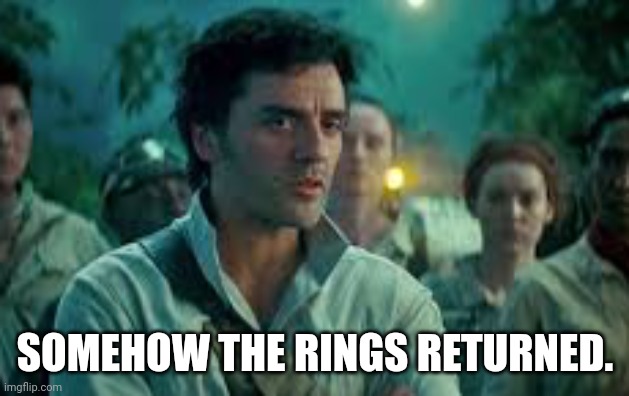Ugh and double-ugh! Even aside from the plot sounding terrible, the sheer hubris and moxie of trying to write a sequel to Lord of the Rings is unimaginable.
Tolkien himself tried and couldn't do it. He started a manuscript titled "The New Shadow," set 100 years after Aragorn's death in the reign of his son:
"Then I of course discovered that the King's Peace would contain no tales worth recounting; and his wars would have little interest after the overthrow of Sauron; but that almost certainly a restlessness would appear about then, owing to the (it seems) inevitable boredom of Men with the good: there would be secret societies practising dark cults, and 'orc-cults' among adolescents.)"
He got all of 13 pages in before concluding that it was "not worth doing."
Somewhat off topic: Looking over the history of Middle-Earth, one sees a repeating pattern: A period of terrible struggle and tragic sacrifice, followed by victory over evil and a golden age, which decays into a long, slow decline. People grow complacent and corrupt, the fruits of those hard-won victories are squandered, and finally evil bursts forth once more and a new struggle is joined.
Furthermore, each struggle takes a toll on the powers of both good and evil. Each golden age is less golden than the previous one, and each struggle pits lesser heroes against lesser villains: First the Valar battling Melkor at the height of his power, then the Noldor in their full glory attacking the corrupted and weakened Morgoth, then Sauron wielding the One Ring against the Last Alliance, and finally the surviving heirs of Numenor and the few remaining Elves fighting to hold back a maimed and Ringless Sauron.
Seen in this larger context, the mostly-happy ending of LotR is somewhat illusory: Because the book opens at the tail end of a decline, and concludes with the start of the next golden age, things seem to have gotten better. Any sequel -- if it remained true to the overall arc of Middle-Earth's history -- would destroy that illusion; first, because it would reveal how Aragorn's golden age fell into decline, and second, because any struggle it depicted would have to set lesser heroes than the Fellowship against a lesser foe than Sauron.
I think it would be
possible to write such a sequel and do it well, but it would not be a heroic fantasy tale. It would be grim to the point of despair, the heroes would tend to destroy themselves, and the ending would be horribly bleak. Tolkien was certainly capable of writing grim stories with self-destructive heroes and bleak endings (as a certain T. Turambar could attest, not to mention Feanor and his epically dysfunctional family), but I'm not sure he could have forced himself to stretch out one such story to novel length*, and I don't blame him for not wanting to. Particularly when most of his audience would hate it.
Someday after LotR passes into the public domain, perhaps someone will write that sequel. I feel on pretty solid ground to say the "someone" will not be Mr. Polychron.
*Yes, the Silmarillion was novel-length, but it was a compilation of many stories written separately over many years, with endings ranging from the bittersweet union of Beren and Luthien to the utter soul-crushing despair of Turin and Nienor. Moreover, it was Christopher Tolkien who did the actual compiling.



